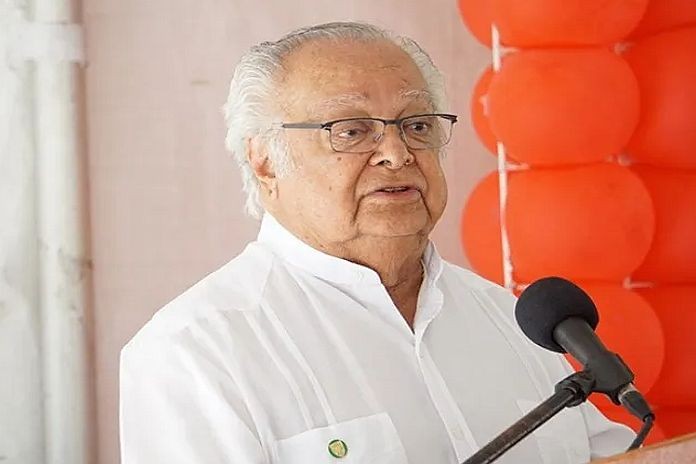A reflection by Shridath Ramphal
I am too old to be activist; but not too old to urge. And when the urging is about human existence – perhaps, the years impose a duty.
I reflect on two prime ministers of Sweden it was my privilege to know. Sweden itself is a country that has made the world a better place by being a part of it. It is not strange that my memory has this focus.
The first prime minister was Olof Palme. In 1982, he chaired the Independent International Commission on Disarmament and International Security Issues, whose membership included Cyrus Vance of the USA and Giorgi Arbatov of the USSR I was a member of the Commission. Our Report was called Common Security.- A Programme for Disarmament.
The other prime minister, years later, was Ingvar Carlsson. In 1995, he chaired the Commission on Global Governance. I was his co-chairman. Our Report was called Our GLOBAL Neighbourhood – a Report Nelson Mandela described as ‘a timely work deserving our full attention’.
I recall Mandela’s counsel because the recommendations of both Commissions have never been more timely than now – when their collective import assumes, for human civilisation, existential significance.
I urge our endangered world to revisit these Reports, and I support that call by the following insights from them that continue to summon humanity. Their functional recommendations for action fulfilled these exhortations.
From common security
Less than two generations after the carnage of the Second World War, the world seems to be marching towards the brink of a new abyss, towards conflicts whose consequences would exceed experience and defy imagination. Having survived the tragedies of two global wars in this century, wars that touched virtually all nations, leaving tens of millions dead, hundreds of millions wounded or homeless, and a whole continent in shambles, mankind might have embraced new means of organising the international community, means that could prevent such catastrophes in the future. […]
It is long past the time for men and women to halt these trends. The dangers are far too great to be ignored. Decisive action must be taken now to halt and reverse the spiral of the arms race and the deterioration of political relations, and to reduce the risks of conventional and nuclear wars. […]
In the modern age, security cannot be obtained unilaterally. Economically, politically, culturally, and – most important – militarily, we live in an increasingly interdependent world. The security of one nation cannot be bought at the expense of others. […] Peace cannot be obtained through military confrontation. It must be sought through a tireless process of negotiation, rapprochement, and normalisation, with the goal of removing mutual suspicion and fear. We face common dangers and thus must also promote our security in common. [From Chapter 1. Common survival.]
From our Global neighbourhood
Global governance, once view primarily as concerned with intergovernmental relationships, now involves not only governments and intergovernmental institutions but also non-governmental organisations (NGOs), citizens movements, trans-national corporations, academia, and the mass media. The emergence of a global civil society, with many movements reinforcing a sense of human solidarity, reflects a large increase in the capacity and will of people to take control of their own lives.
States remain primary actors but have to act with others. The United Nations must play a vital role, but it cannot do all the work. Global governance does not imply world government or world federalism. Effective global governance calls for a new vision challenging people as well as governments to realise that there is no alternative to working together to create the kind of world they want for themselves and their children. It requires a strong commitment to democracy grounded in civil society. […]
We believe that a global civic ethic to guide action within the global neighbourhood and leadership infused with that ethic are vital to the quality of global governance. We call for a common commitment to core values that humanity could uphold: respect for life and liberty, justice and equity, mutual respect, caring, and integrity. We further believe that humanity as a whole will be best served by recognition of a set of common rights and responsibilities. […]
Whatever the dimensions of global governance, however, renewed and enlarged its machinery, whatever values give it content, the quality of global governance depends ultimately on leadership. At the national, regional and international levels, within communities and in international organisations, in governments and in non-governmental bodies, the world needs credible and sustained leadership.
It needs leadership that is proactive, not simply reactive, that is inspired, not simply functional, that looks to the longer term and future generations for whom the present is held in trust. It needs leaders made strong by vision, sustained by ethics, and revealed by political courage that looks beyond the next election.
This cannot be leadership confined within domestic walls. It must reach beyond country, race, religion, culture, language. life-style. It must embrace a wider human constituency, be infused with a sense of caring for others, a sense of responsibility to the global neighbourhood. [From Chapter 7 – A Call to Action.]
The messages of these two international Commissions remain insistent as we compulsively ponder today the question –‘Wither our World’.






